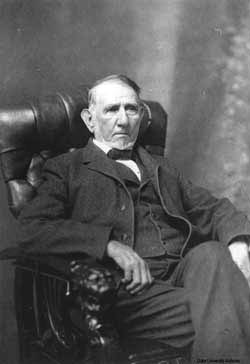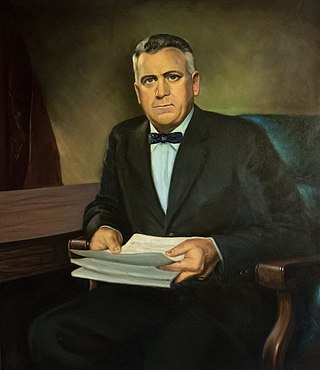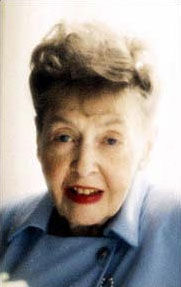
James Buchanan Duke was an American tobacco and electric power industrialist best known for the introduction of modern cigarette manufacture and marketing, and his involvement with Duke University. He was the founder of the American Tobacco Company in 1890.

Washington Duke was an American tobacco industrialist and philanthropist. During the American Civil War he enlisted in the Confederate States Navy. In 1865, Duke founded the "W. Duke, Sons & Co.", a tobacco manufacturer that would be merged with other companies to form conglomerate American Tobacco Company in 1890.

The Wellcome Trust is a charitable foundation focused on health research based in London, in the United Kingdom. It was established in 1936 with legacies from the pharmaceutical magnate Henry Wellcome to fund research to improve human and animal health. The aim of the Trust is to "support science to solve the urgent health challenges facing everyone." It had a financial endowment of £29.1 billion in 2020, making it the fourth wealthiest charitable foundation in the world. In 2012, the Wellcome Trust was described by the Financial Times as the United Kingdom's largest provider of non-governmental funding for scientific research, and one of the largest providers in the world. According to their annual report, the Wellcome Trust spent GBP £1.1Bn on charitable activities across their 2019/2020 financial year. According to the OECD, the Wellcome Trust's financing for 2019 development increased by 22% to US$327 million.
The Robert Wood Johnson Foundation (RWJF) is an American philanthropic organization. It is the largest one focused solely on health. Based in Princeton, New Jersey, the foundation focuses on access to health care, public health, health equity, leadership and training, and changing systems to address barriers to health. RWJF has been credited with helping to develop the 911 emergency system, reducing tobacco use among Americans, lowering rates of unwanted teenage pregnancies, and improving perceptions of hospice care.

A financial endowment is a legal structure for managing, and in many cases indefinitely perpetuating, a pool of financial, real estate, or other investments for a specific purpose according to the will of its founders and donors. Endowments are often structured so that the inflation-adjusted principal or "corpus" value is kept intact, while a portion of the fund can be spent each year, utilizing a prudent spending policy.

The W. K. Kellogg Foundation was founded in June 1930 as the W. K. Kellogg Child Welfare Foundation by breakfast cereal pioneer Will Keith Kellogg. In 1934, Kellogg donated more than $66 million in Kellogg Company stock and other investments to the W. K. Kellogg Trust. As with other endowments, the yearly income from this trust funds the foundation.

Doris Duke was an American billionaire tobacco heiress, philanthropist, and socialite. She was often called "the richest girl in the world". Her great wealth, luxurious lifestyle, and love life attracted significant press coverage, both during her life and after her death.
Lilly Endowment Inc., headquartered in Indianapolis, Indiana, is one of the world's largest private philanthropic foundations and among the largest endowments in the United States. It was founded in 1937 by Josiah K. Lilly Sr. and his sons, Eli Jr. and Josiah Jr. (Joe), with an initial gift of Eli Lilly and Company stock valued at $280,000 USD. As of 2020, its total assets were worth $21 billion.

Johnson C. Smith University (JCSU) is a private historically black university in Charlotte, North Carolina. It is affiliated with the Presbyterian Church (USA) and accredited by the Southern Association of Colleges and Schools (SACS). The university awards Bachelor of Science, Bachelor of Arts, Bachelor of Social Work, and Master of Social Work degrees.
The History of Duke University began when Brown's Schoolhouse, a private subscription school in Randolph County, North Carolina, was founded in 1838. The school was renamed to Union Institute Academy in 1841, Normal College in 1851, and to Trinity College in 1859. Finally moving to Durham in 1892, the school grew rapidly, primarily due to the generosity of Washington Duke and Julian S. Carr, powerful and respected Methodists who had grown wealthy through the tobacco industry. In 1924, Washington Duke's son, James B. Duke, established The Duke Endowment, a $40 million trust fund, some of which was to go to Trinity College. The president thus renamed the school Duke University, as a memorial to Washington Duke and his family.
ECU Health Medical Center is a hospital located in Greenville, North Carolina. It is the primary teaching hospital for East Carolina University's Brody School of Medicine and is the flagship medical center for ECU Health. ECU Health is a Level 1 Trauma Center, one of 6 in the state of North Carolina. It is the only level I trauma center east of Raleigh, and thus is the hub of medical care for a broad and complicated rural region of over 2 million people. ECU Health Medical Center is the largest employer in Eastern North Carolina and 20th overall in the state.

John Edward Fogarty was a Congressman from Rhode Island for 26 years. He was a member of the Democratic Party. John Edward Fogarty was influential in passing numerous legislations and acts. For his service he received awards and honors.

Ruth Lilly was an American philanthropist, the last surviving great-grandchild of Eli Lilly, founder of the Eli Lilly and Company pharmaceutical firm, and heir to the Lilly family fortune. A lifelong resident of Indianapolis, Indiana, Ruth Lilly is estimated to have given away nearly $800 million of her inheritance during her lifetime, mostly in support of the arts, education, health, and environmental causes in Indianapolis and in Indiana.
The Duke University Health System combines the Duke University School of Medicine, the Duke University School of Nursing, the Duke Clinic, and the member hospitals into a system of research, clinical care, and education.
Duke University Hospital is a 957-bed acute care facility and an academic tertiary care facility located in Durham, North Carolina, United States. Established in 1930, it is the flagship teaching hospital for the Duke University Health System, a network of physicians and hospitals serving Durham County and Wake County, North Carolina, and surrounding areas, as well as one of three Level I referral centers for the Research Triangle of North Carolina. It is affiliated with the Duke University School of Medicine.
James Alexander Gray Jr. was a president and chairman of R. J. Reynolds Tobacco Company in Winston-Salem, North Carolina. He was the brother of fellow R.J. Reynolds president Bowman Gray Sr. He also served as a North Carolina state senator for two terms and as a philanthropist, donated to a variety of educational causes in North Carolina.

Mary Duke Biddle Trent Semans was an American heiress, activist, politician, and philanthropist. She was the granddaughter of Benjamin N. Duke and the great-granddaughter of Washington Duke, both tobacco and energy tycoons who helped start Duke University. Semans is remembered for her support and work towards promoting the arts and humanities through various philanthropic entities.

Lincoln Hospital was a medical facility located in Durham, North Carolina founded to serve the African Americans of Durham County and surrounding areas. With original hospital construction financed by the Duke family, Lincoln served as the primary African American hospital in Durham from its opening in 1901 until 1976, when it closed and transferred its inpatient services to Durham County General Hospital.












